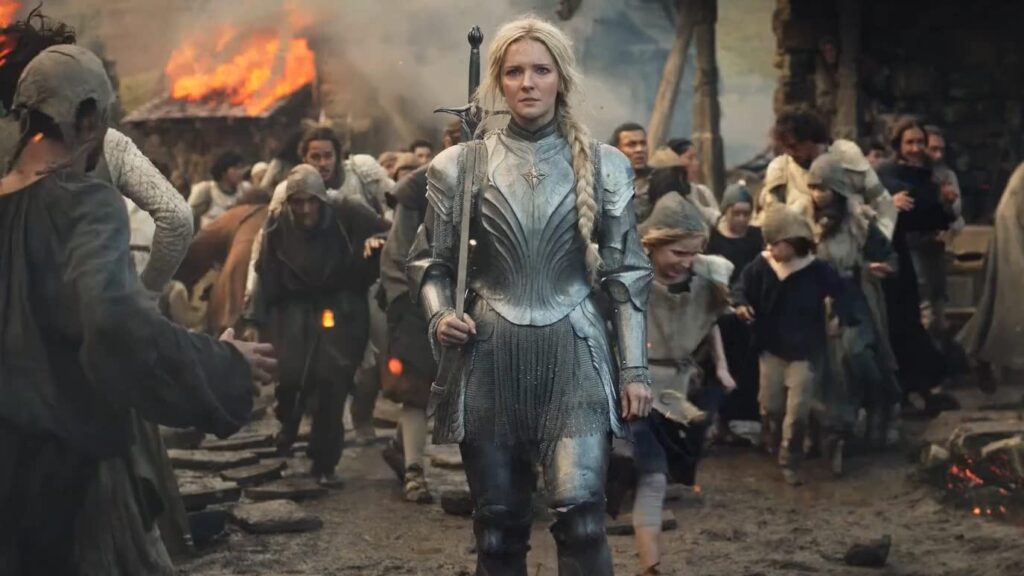The Lord of the Rings: the Rings of Power is a frustrating show. At several points in the eight-episode first season, the show is entertaining, epic, and even compelling. But it fails to carry this momentum forward, marred by a multitude of stupid character- and narrative- decisions.
Galadriel (Morfydd Clark) is a seasoned Elf warrior who’s seen thousands of years of warfare since Morgoth, the first Dark Lord, began his rampage across the world of Arda. Now tracking Sauron, the second Dark Lord, Galadriel is determined to stop him from gaining dominion over MIddle-Earth at any cost, including turning away from the doors of the eternal land of Valinor. She ends up in the island kingdom of Numenor along with a human named Halbrand, who seems to have a mysterious past.
Meanwhile, Galadriel’s dear friend, Elrond (Robert Aramayo) is assigned to help the greatest living smith in the world, Celebrimbor (Charles Edwards) who dispatches Elrond to the dwarf kingdom of Khazad-dûm on an errand that becomes clear to Elrond only later. Another elf, Arondir (Ismael Cruz Cordova) becomes an unlikely protector of a village in the Southlands as Orcs emerge from the shadows, commanded by a mysterious leader named Adar (Joseph Mawle).
Finally, there’s Nori (Markella Kavenagh), a Harfoot who discovers a tall stranger with magical powers in a crater, and against all prevailing wisdom in her tribe, decides to befriend him.
It would be easier to dismiss The Lord of the Rings: The Rings of Power if it was simply bad. The visuals, dripping with detail and cinematic wonder, are probably the first thing you’re going to notice. The soundtrack by Bear McCreary, complete with a title track composed by Howard Shore (who scored the Peter Jackson The Lord of the Rings and The Hobbit films), is also appropriately grand and menacing when it has to be. The acting from most of the cast is also solid, especially from the much-maligned diverse characters such as Arondir and Disa (Sophia Nomvete).
Yet, this is a show that’s focused on mysteries, to the extent that its character arcs are neglected.
It’s not these are two-dimensional characters- rather they have interesting conflicts going on, and The Rings of Power pays attention to several important relationships, such as the one between Elrond and Prince Durin IV (Owain Arthur). The show, however, is most interested in teasing the various possible identities of Sauron. The way this is handled makes several characters look like fools in retrospect. Showrunners J.D. Payne and Patrick McKay are too focused on carrying out their several seasons-long grand plans, and the characters suffer as a result.
A lot of effort is spent making Galadriel a formidable, cold warrior who’s almost consumed by her need for revenge, but she comes across as not only imperious but also irritable and needlessly antagonistic.
As majestic as the cities and vistas shown in The Lord of the Rings: The Rings of Power are, the inner lives of the characters living in these places are scarcely explored. Numenor is reduced to politicians, Elendil’s (Lloyd Owen) family, and a rabble of common folk, smiths, and merchants who are threatened by the arrival of an elf in their capital city. The Southlands is reduced to only a handful of villages, of which only one is covered prominently. There’s a point in episode seven where the villagers proclaim a certain character as the King of the Southlands. The supposed grandeur of this scene falls woefully short when compared to Aragorn’s own return to Gondor in The Return of the King.
The Rings of Power is still entertaining in small doses, including episode seven where several storylines connect and a Helm’s Deep-esque battle sequence takes place, complete with an eleventh-hour rescue by the cavalry. However, the show treats large distances poorly, with characters covering not only hundreds but thousands of miles worth of journey in a handful of days, if not hours.
The Lord of the Rings: The Rings of Power, fortunately, isn’t beyond saving. The showrunners have noted that they will take audience feedback into account while creating future seasons. Let’s hope that the show capitalizes on its strengths and compensates for its missteps when it returns.
